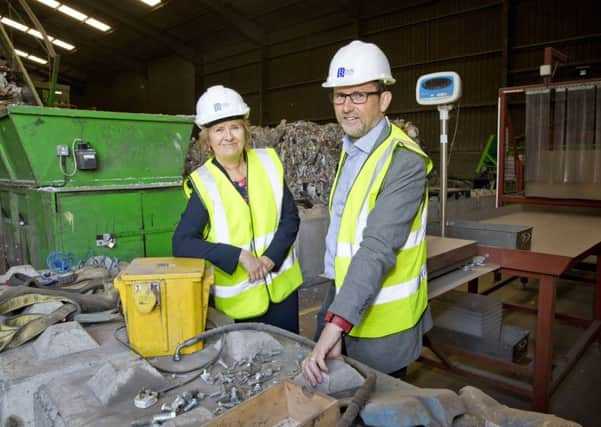New Scottish recycling hub to transform recycling


The £3.4 million Project Beacon, at Binn Eco Park in Glenfarg, will use state-of-the-art technology to process all types of plastic rubbish for the first time.
Even items such as broken toys and crates, which would usually be sent to landfill, can be dealt with.
Advertisement
Hide AdAdvertisement
Hide AdA joint initiative between four firms, it will also host the country’s first commercial recycling machine that can convert plastic back to oil.
It has been described as a “globally disruptive” innovation.
The scheme has been awarded £1.7 million of funding from Zero Waste Scotland’s Circular Economy Investment Fund, which is supported by the Scottish Government and the European Regional Development Fund.
A further £1.7 million has come from private sector backers.
PI Polymer Recycling, Binn Group, Recycling Technologies and Impact Recycling have joined forces to create the plant.
“We’re on a mission to have no plastics left behind,” said John Ferguson, director of Perthshire-based EcoideaM and founder of Pi Polymer Recycling.
“In the first phase we’ll be able to take any large rigid plastics, including broken toys, crates, plastic pipe, garden furniture, drums and so on.
“In the second phase we’ll be accepting all types of plastics collected at the kerbside. Any that can’t be sorted will become chemical feedstock for new products.
Advertisement
Hide AdAdvertisement
Hide Ad“No one is doing this at the moment unless they’re incinerating or landfilling plastics. It could be a globally disruptive model.”
The system uses state-of-the-art separation systems to support mechanical recycling, together with a pioneering chemical recycling process.
This includes a patented technique based on thermal cracking, which processes plastic that typically cannot be recycled using mechanical methods – for example, mixed, laminated, black, film and even contaminated plastic waste, as well as hard plastics.
The new process produces a range of chemical constituents that can be used to create new virgin plastics or other chemical products.
It’s hoped the facility, which will operate as a demonstration model, will be up and running later this year.
Adrian Griffiths, chief executive officer of Recycling Technologies, added: “You can help solve the problem in the oceans by making waste plastic valuable on land.
“By combining existing and innovative mechanical and chemical recycling technologies, Project Beacon boosts the local economy and enables household and large rigid plastics to be recycled instead of incinerated.”
Iain Gulland, chief executive of Zero Waste Scotland, has welcomed the new hub.
Advertisement
Hide AdAdvertisement
Hide AdHe said: “I am delighted not only that our financial support is helping create a potentially world-leading recycling facility here in Scotland, but that Zero Waste Scotland’s expertise has been instrumental in bringing it about.
“Project Beacon has the potential to transform plastics recycling in Scotland and beyond.”
Plastics production has surged over the past 50 years, from 15 million tonnes in 1964 to more than 300 million tonnes, and is expected to double again over the next 20 years.
Packaging is the biggest application of plastics but globally only 14 per cent is collected for recycling
Estimates suggest at least eight million tonnes of waste plastic is ending up in oceans every year.
Scottish environment secretary Roseanna Cunningham says the scheme could be “ground-breaking”, finding new uses and economic potential for hard-to-recycle plastics.
She added: “Project Beacon’s ethos and partnership approach supports our work to tackle Scotland’s throwaway culture which includes our commitment to a deposit-return scheme and the recent appointment of an expert panel to look at single-use items.”